If you are in the process of selecting a braking system for your vehicle, you may be wondering which type is best for your needs. This article will discuss the differences between hydraulic surge brakes and electric brakes, including how they work and the pros and cons of each type.
By the end of this article, you will better understand the options available and be able to make an informed decision on which type of brakes is best for your vehicle. Let’s get started!
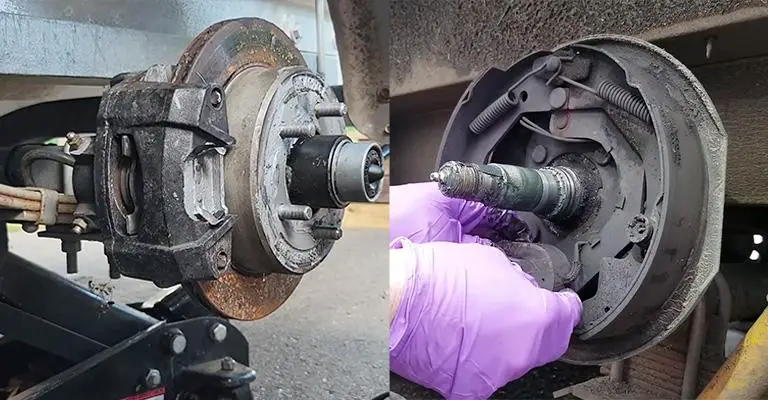
Contents
Comparing Hydraulic Surge Brakes And Electric Brakes
Hydraulic surge brakes and electric brakes are two different braking systems used in vehicles.
Hydraulic surge brakes use a hydraulic system to transfer the force applied by the driver’s foot on the brake pedal to the brake pads, clamping onto the brake rotors to slow down or stop the vehicle.
The hydraulic system consists of a master cylinder connected to the brake pedal and a brake fluid reservoir. When the driver pushes the brake pedal, the master cylinder pushes brake fluid through the system to the brake calipers, which apply pressure to the brake pads.
On the other hand, electric brakes use an electric motor to activate the brake pads. They are often used in trailers, as they allow the driver of the towing vehicle to control the brakes on the trailer using the brake pedal in the towing vehicle.
Electric brakes are typically activated by a brake controller installed in the towing vehicle and connected to the electric brakes via a wiring harness.
There are pros and cons to both hydraulic surge brakes and electric brakes. Hydraulic surge brakes are generally more reliable and easier to maintain, but they can be more expensive to repair if a problem arises.
Electric brakes are usually less expensive to repair, but they can be more prone to failure if there is a problem with the electric system.
Ultimately, the choice between hydraulic surge brakes and electric brakes will depend on the specific needs and preferences of the vehicle owner.
Difference Between Surge Brakes And Electric Brakes
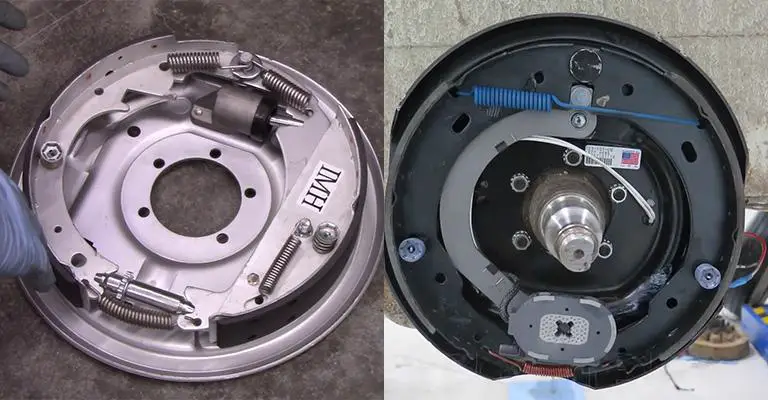
Electricity is the biggest difference when it comes to braking. For an electric brake to function, it needs a battery. You will not be able to brake effectively if the battery goes dead. To work correctly, they need an emergency switch and a controller.
None of those parts are needed for surge brakes. Because of that lack of complexity, there are fewer problems and fewer problems with components. There are no wires or complicated mechanisms in surge brakes, so they are easy to maintain. All your tow vehicle needs are the lack of momentum.
Although electric brakes are complicated pieces of safety equipment, their sophistication allows them to be fitted with more safety features. Another difference is that surge brakes have few safety features except what’s attached to the hitch.
Furthermore, the electric brakes can be challenging to set up with your tow vehicle. It is important to ensure all the wires are lined up and that the controller has the right number of pins.
It won’t be long before you can’t get anywhere if there is a problem with the connection. A lot of time and money can be involved in repairing the electric braking system.
Surge Brakes vs. Electric Brakes | Which One Is Better?
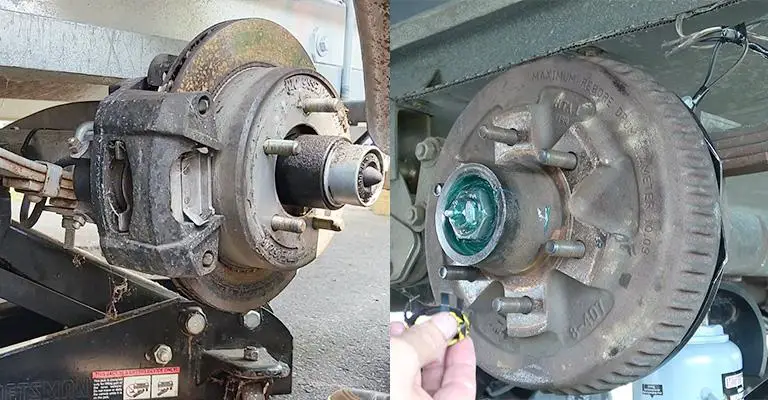
Despite all the uncertainty, one thing is certain. Electric brakes are not recommended for a trailer carrying a boat. In particular, water and electricity do not work well together when the brakes are submerged. Surge brakes are the way to go when you have a lot of water to deal with.
In terms of operation design, the most significant difference is apparent. A mechanical chain connected to the tow vehicle is required to operate the surge brakes. Battery, emergency switch, and brake controller are all necessary to operate the electric brakes. As more parts are added, the opportunities for failure increase.
How do Hydraulic Surge Brakes Work?
The Surge Brakes use hydraulics and the trailer’s natural momentum to act as a brake. Whenever you step on the brakes in your tow vehicle, the trailer presses down on the hydraulic cylinder in the hitch.
Generally, the trailer brakes are more prone to slipping when the vehicle slows down. As long as they are correctly adjusted, surge brakes are smooth and easy to operate. Trailer brakes cannot be operated separately if the trailer is swaying, which is a disadvantage.
How do Electric Brakes Work?
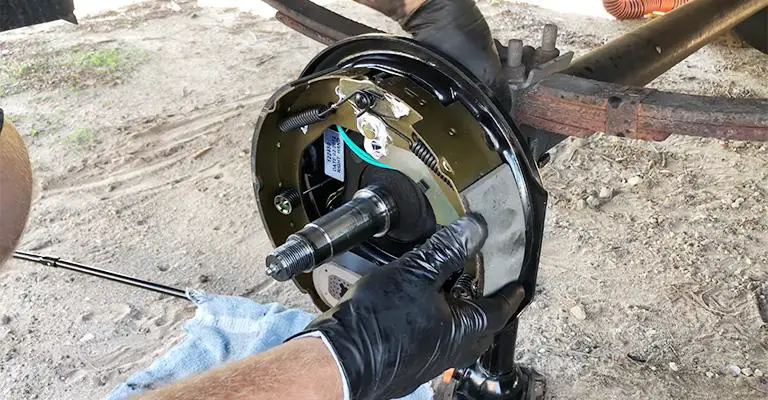
With electric brakes, you have more control over your braking and greater ease of use. Electric brakes are simpler to use than surge brakes but require a brake controller inside the towing vehicle.
A vehicle’s brake controller controls the electricity going to the brakes, and the brake light circuit controls how electromagnets activate the brakes.
It is also possible to use the brake controller to put a small amount of braking force on the trailer if it is swaying with your hand. Electric brakes work exceptionally well if appropriately adjusted, and you can also reach over and use the controller if it is swaying without applying the brakes. You’ll find it useful when driving down hills, in high winds, or passing by large 18-wheelers.
What Are Surge Brakes On a Trailer?
Mechanical brakes slow down a trailer when you press the brake pedal on a towing vehicle. In surge brake systems, brakes are activated by trailer momentum.
In slowing the tow vehicle, the trailer pushes against the hitch, causing a hydraulic cylinder to be compressed. The trailer brakes are under more pressure when the tow vehicle’s brakes are pressed harder.
You do not have to worry about the trailer overrunning your tow vehicle, as it slows down accordingly. Nonetheless, surge brakes should be appropriately adjusted to ensure a smooth operation. Because it is not a sophisticated braking system, it is easy to work with.
The drawback is surge brakes may not operate properly if the trailer begins to sway. It is also impossible to get them to act independently when swaying. If there is enough weight on the tongue, you shouldn’t experience any sway issues.
Are Surge Brakes Better Than Electric?
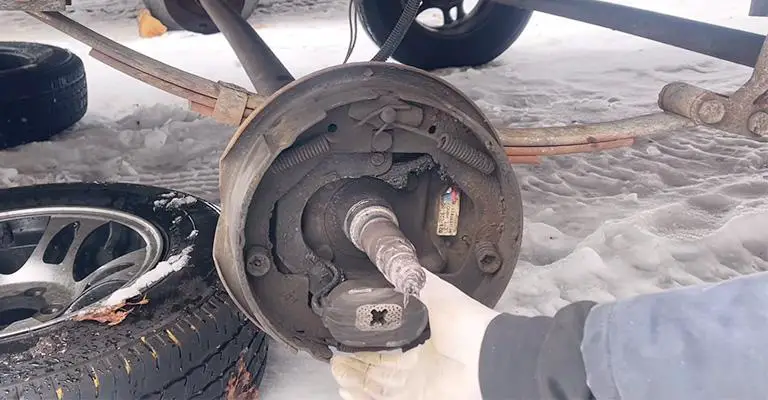
The situation is when there are six of one and a half dozen of another. Sometimes surge brakes are better than electric ones, and occasionally electric ones are better. The electric brakes perform best during downhill riding, while the surge brakes perform best during water travel.
There will be some sway with both systems, but with electric brakes, you may be safer than with surge brakes because of their extra safety features.
There are a few types of trailers that have surge braking systems: caravans, horse trailers, and boat trailers. The number may vary depending on who made the trailer and which system you choose.
It is a very efficient system to use surge brakes, though they are unsuitable for every situation. Occasionally, electric brakes will be the best option; if you don’t have them, you must drive more cautiously.
It is easier to fix the system with surge brakes since you do not need to know electronics, wiring diagrams, or how to connect wires.
Do Travel Trailers Have Surge Brakes?
Most trailers are equipped with brakes. Either surge or electric power can be used. Trailers weighing less than 3,000 pounds are usually not required to have brakes according to this rule. Make sure you know if you require them by contacting your state’s office that governs this situation.
In the case of travel trailers, the manufacturer gets to choose what type of brakes to put on them. All of their trailers may be required to have electric brakes under state regulations. Surge brakes aren’t typically found on travel trailers, so you might not see them often.
Regulations like this one exist for safety reasons, not for operation problems. Don’t hesitate to contact your dealer if you have any questions about your travel trailer. Hopefully, they are aware of it, or they are just looking at your wheels if they are not. The brakes of your car are electric if you see a magnet.
The identification can be confirmed by looking under the hitch. You may have surge brakes if you see a large cylinder. Many factors will affect the quality of these brakes, so we cannot comment on their quality.
Do I Need Surge Brakes?
I can only say no, and that is the most straightforward answer we can provide. Surge brakes are sometimes necessary, but you won’t be putting your travel trailer in the water soon.
Consequently, surge brakes might not be permitted on your travel trailer or other trailers. Safety reasons make electric brakes mandatory in different states. To find out what your state requires, you must check with your local DMV or other government offices.
To qualify, you must be hauling a trailer weighing over 3,000 pounds to install a braking system. It is a rule that cannot be changed. It can, however, be either an electric braking system or a surge braking system. Trailers towed without surge brakes do not require surge brakes.
Final Words
Getting the right braking system for your trailer is crucial to avoid many headaches. With surge brakes, you get efficient, reliable, and easy-to-use performance. However, if you live in an incorrect state, you may not be able to use them.
Though neither system is perfect, they are two of the best available methods for trailers. There is a difference between the two in terms of complexity, maintenance, and repairs. This system does not use electricity.
